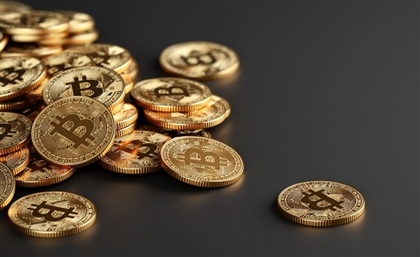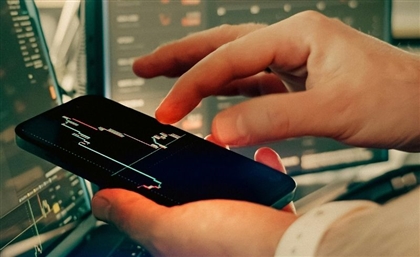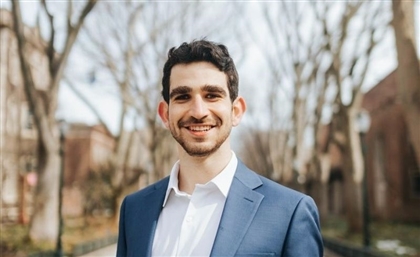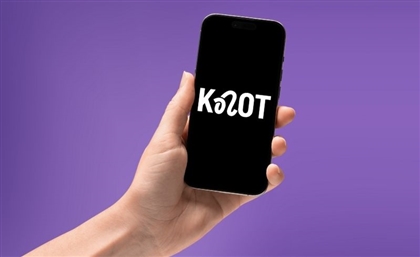Inside the Secretive World of Egypt's Bitcoin Miners
The value of the world's first cryptocurrency has skyrocketed, reaching over $4,000 and making waves worldwide. Charlotte Swan delves into the furtive hideouts of Egyptian miners, who are taking advantage of cheap energy prices to farm cash with their computers.
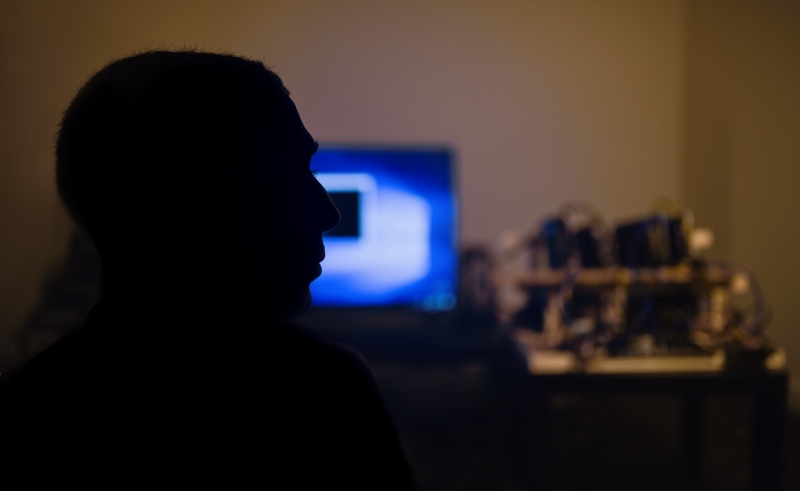
We perched on the edge of a bare mattress next to his sprawling franken-computer, its many components balanced on a homemade wooden frame, cables radiating outward from the machine like creeping ivy. I had exhausted my social network in search of connections to the underground community of bitcoin miners and traders I had heard whisperings about. In Egypt, they number in the thousands, but only a few were willing to speak to media. Hussein* was one of them. People are farming money with their computers across the globe, but Egypt's miners are especially secretive. “They’ll be afraid to talk to you. Shit happens everywhere for no reason,” one of them said in a message. “Yeah, I mine bitcoin,” said another. “But that doesn’t mean I’m going to tell you anything about it.”
But how was this computer lining Hussein’s pockets? It turns out this monster PC was built for one purpose alone: generating cash. Cryptocurrency is digital money with real-world value, and it’s taking the world by storm, as it revolutionizes the possibilities in finance: this is money that exists without any central authority, and its allure stretches way beyond finance scholars. Recently, cryptocurrency has attracted a new group of devotees who aren’t obsessed out of interest in its financial or technological implications; they’re obsessed because the cryptocurrency world introduces them to something else entirely.
Cold, hard, digital cash.

How do you mine bitcoin?
Bitcoin, the first and most famous cryptocurrency, was introduced to the world in 2009. Over the past eight years, interest in the digital coin had been simmering quietly, its value experiencing small spikes and dips, but rising too slowly for most of the world to take notice. It wasn’t until April 2017 that global interest surged and its market price skyrocketed, faster than anyone could anticipate - anyone but its diehard believers, that is. As this article is being written, one bitcoin is worth an all-time high of over $4,200. Back in 2010, the value of a single bitcoin had been a meager $0.003. To put this in a global perspective, in early August, the total value of all bitcoin in circulation surpassed the entire money supply of Egypt, at over $56 billion.
If you thought mining was just for gold, think again. In cryptocurrency circles, “mining” refers to the dedication of processing power from high-end computers to performing calculations on the network. Cryptocurrency networks thrive on contributions of work from their communities, as participants’ computers do the work of the encryption and verification of transaction records, which are hosted on peer-to-peer networks. Thus, members are rewarded for their work with a small amount of the currency, shared among all the computers on the network. The more work a computer does, the bigger its share of the reward. And that’s why people started building mining farms -computers with extra processing units to earn them more money.
Although “bitcoin” is frequently used colloquially to refer to any blockchain-based digital currency with real-world value, there are actually many flavors of digital money and “Bitcoin” technically refers to only one. Egypt’s most frequently mined coin is Ethereum, and it’s the currency of choice because it’s the most profitable option to mine with the hardware that’s easily accessible in the country. While Bitcoin is most efficiently mined with special machines called ASICs, Ethereum can be mined with graphics cards (GPUs), which are standard necessity for any PC hobbyist interested in processing-heavy activities like gaming or video editing.
But let’s go back to that sweltering Cairo apartment, one among a multitude of hidden farms where these secretive hobbyists are mining cryptocurrency. The reality of mining in Egypt deromanticizes the typical bitcoin geek stereotype held by the uninitiated. These people aren’t hackers slouching over their keyboards late at night. Hussein, the former economics student seated next to me, certainly isn’t one. Perhaps the only stereotypical thing about this community is that it is overwhelmingly male: of the thousands of members of Egypt’s cryptocurrency interest groups on Facebook and Whatsapp, women are few and far between. Other than that, Egypt’s miners don’t fit neatly into one category. Some are computer aficionados bent on maximizing and testing the limits of their hardware; others are forex traders branching out into a new frontier in the finance world. And still others just want the money.
The reality of mining in Egypt deromanticizes the typical bitcoin geek stereotype held by the uninitiated.
Whether doctors, programmers, economists, entrepreneurs, or oil technicians, they’re all united by one quality: they are innovation enthusiasts capitalizing on the opportunity to adopt an increasingly valuable currency in a country where mining is significantly more profitable than in the Western world. One of them lives and mines with a group of friends in a remote village several hours outside of Cairo - possibly the last place one might expect to find a supercomputer hammering out the newest, most advanced form of currency the world has ever seen.
Cheap electricity, higher mining profits
Why Egypt, of all places? The answer is a direct consequence of the physical demands of farming cryptocurrency. A miner’s computer is a tireless machine, slaving away at all hours transforming math into money. The price of this immense power is in the energy draw required to keep the hardware from overheating until it destroys itself; its built-in fans aren’t enough to combat the heat generated by such a constant, strenuous workload. External fans and air conditioning are needed to keep mining farms cool. Even as we sit motionless in Hussein’s room, separated from the relentless Cairo sun by thick shades drawn across the windows, beads of sweat are crawling down our foreheads. “I definitely need a shower after this,” he grimaces, wiping his brow with a tissue.

Demanding as it is to keep things cool in a desert country, energy costs in Egypt are exceedingly cheap in comparison to other developed nations. “Recently people in Egypt started mining a lot because energy prices are really, really low,” Hussein explained. “Until recently, energy was subsidized, and a lot of people don’t even pay for electricity, which is sad. But that’s part of why it’s more profitable to mine in Egypt… Yes, of course I pay my electricity bill,” he added quickly.
Mohammed, a twentysomething Cairo native who has been mining Ethereum for about a year, says it’s about more than just cheap energy, it’s about how you pay for the energy as well.
Mohammed, a twentysomething Cairo native who has been mining Ethereum for about a year, says it’s about more than just cheap energy, it’s about how you pay for the energy as well. “I think it’s better to mine in Egypt because you pay your energy bills in local currency, but you get your investment back in cryptocurrency,” he told me in a hushed voice while seated across from me, tucked away in a quiet neighborhood café. He explained that the contents of his digital wallet had retained their value more reliably than the Egyptian pound. “And the electricity in Egypt is so cheap – if I were mining in a different country, I’d have to calculate if I’d even make any money.” He shows me photos of his mining rigs on his phone. His computers are built almost haphazardly, dusty messes of GPUs and cables stacked on top of faded Nestle boxes in a room otherwise entirely empty but for a fan pointed at the setup. It looks shabby, but his farm generates more money than I make in a month.
Even some expats are considering coming back to Egypt to mine. Bassem is an Egyptian currently living in Qatar. “There’s free power in Doha. That’s the main reason I started mining here.” He plans to return to Egypt sometime this year. Will it still be profitable without free energy? “I already broke even a long time ago,” he wrote back in a message. “Even if I start paying for energy, my farm will still be profitable in Egypt.” He owns a fleet of ASIC machines, optimized for mining Bitcoin. I asked him if miners generally had concerns about moving restricted hardware across the border. “This is a matter of absolute luck,” he said.
Depending on market fluctuation, a one-time 50,000 LE investment in equipment can earn the equivalent of about $400 a month.
A background in economics fueled Hussein’s interest in cryptocurrency, and he started mining in 2012 after learning about Bitcoin in a YouTube video. “I quit my job and moved to Egypt. Without cryptocurrency, I probably wouldn’t have been able to do that,” he remarked. “It has enabled me to take the time to think about my future plans, rather than worry about monthly expenses. Especially in Egypt, by mining you can make enough money to just live. Depending on market fluctuation, a one-time 50,000 LE investment in equipment can earn the equivalent of about $400 a month. But most of my profit isn’t from mining. For me it’s trading - I’ve made the most money in cryptocurrency, even more than investing in real estate. The amount you can make from mining is really relative to the fluctuations in coin prices. The money you get out of mining, you can’t really measure in dollars until you cash out. Profits are never profits until you cash out, losses are never losses until you cash out.”

But why is mining a concealed activity?
When asked about the furtiveness of most cryptocurrency miners, Hussein explained the activity is not officially forbidden, but it’s legally sketchy enough that most people are concerned about being discovered. “I believe what I’m doing is legal. When people get arrested for mining it’s usually because they’re caught with black market foreign currency exchange, or they’re forging money and they just happen to have mining rigs or bitcoin on them. The authorities see this and therefore associate cryptocurrency with illegal activity.”
Suddenly, the defensive attitude of the mining community made a lot more sense. But it’s not legally off-limits? I asked Hussein for clarification. “The recent statements they’ve given say mining is not illegal, but it can get you into trouble for sure. I think the administration is trying to understand cryptocurrency, but they’re still in the process of learning more. I’m 99 percent sure that if they knew more about it, it’d be fully legalized in Egypt,” he said with a snap of his fingers. “Legal like in Japan, the US, England, Europe, legal like in most countries.”
Recent statements say mining is not illegal, but it can get you into trouble for sure.
A commonly held opinion among miners is that a large part of the issue is lack of education about cryptocurrency. Ali, an Egyptian miner with a massive ASIC farm in the Gulf, observed that “we are a third world country. They can’t trace where the money comes from, so they’re worried about money laundering. They don’t understand cryptocurrency, so they warn people not to use it.”
Is cryptocurrency mining good for Egypt?
The recent influx in crypto-mining has been an incredible boon for Egypt’s hardware dealers. “Hardware importers are making very good money right now. They’re happy with the interest in mining. And some of them have even started mining after they learned about it from their customers,” Mohammed* says. Hussein had more to add: “Mining in Egypt is booming, but one issue is the equipment; when the price of Ethereum spiked, demand for GPUs was high and stores couldn’t stock enough of them… Getting GPUs in Egypt is kind of like getting drugs. It’s actually easier to get drugs than to get GPUs sometimes,” he laughed.

Miners often stress that their activities benefit their country financially in more ways than just supporting the hardware market. “Mining brings foreign currency into Egypt, which is good for the economy,” Hussein explained with enthusiasm. “I definitely think it’d be beneficial on many levels to implement cryptocurrency and blockchain technology in Egypt. When you shift from normal currency to cryptocurrency you’re removing human error. And in a developing economy, one major value is getting away from inflation.”
I literally saw a mining rig in a mosque. That was the craziest thing I’ve ever seen.
Mohammed also believes his activities are good for his country. “At the end of the day, if you’re mining, you’re making money, and if you invest this money in Egypt, you’re helping the Egyptian economy. Cryptocurrency is like everything in the world: you can use it in a good way or you can use it in a bad way,” he intoned passionately.
When it comes to good and bad applications of cryptocurrency, there’s a debate that goes beyond the typical question of whether it’s being used for legal activity. It has been suggested by some critics in predominantly Muslim countries that cryptocurrency might be haram, if it can be viewed as making money out of nothing. Hussein’s response to this issue was swift, as if he had spent a great deal of time considering this very issue. “If the monetary system is haram, then sure, bitcoin is haram,” he began. “But in my opinion, it’s not. The trading aspect is definitely not; it’s a mutual agreement, and bitcoin is equal to money, which we already use. And you can actually see a lot of religious people mining bitcoin,” he continued. “There are even extremists who mine bitcoin. I literally saw a mining rig in a mosque. That was the craziest thing I’ve ever seen,” he ejected excitedly, waving his hands in the air.
What should everyone know about cryptocurrency?
Most miners affirm cryptocurrency is the most likely future of finance, bordering on the inevitable. Looking serious, Mohammed told me, “I believe in the future of cryptocurrency – nobody can refute it. It’s already happening now, some countries are already making bitcoin official. I hope that Egypt uses it eventually. They have to know that people here are using it now, that people believe in it and put their trust in it.”
Mining in Egypt is booming, but one issue is the equipment; when the price of Ethereum spiked, demand for GPUs was high and stores couldn’t stock enough of them… Getting GPUs in Egypt is kind of like getting drugs.
Back in Hussein’s apartment, our discussion draws to a close. Post-university, he has devoted a great deal of his adult life to understanding and educating others about the growing world of cryptocurrency, which he believes has a solid future in Egypt and abroad. To the young investor who invited me into his home, it’s about more than just making some extra pocket money. It’s politically and economically significant. “The value of cryptocurrency is decentralization. You don’t have central governance - the governance is the community,” he remarked. “With cryptocurrency, everyone has a voice. Those who believe in it invest more, and that’s like having a vote. I can have an influence on what happens with Ethereum, with Bitcoin, as part of the community. It’s kind of like real democracy.” His passion for the cryptocurrency community is inspiring.
Hussein’s computer suddenly seems much more meaningful than a hobbyist’s attempt to farm a little extra money. Is this machine, and other homemade rigs like it, the future of finance? “Mining is only a small part of cryptocurrency,” he reiterated. “The technology is much deeper than that. The difficulty bump we’re approaching, the energy we’re using, the future of mining in the long term is not sustainable. Getting into mining at this point is not a good idea for most of the world. But here? It’s definitely still a good idea here in Egypt.”
*All names have been changed to protect the interviewees' privacy, following their request.
Video and photos: @MO4Network's #MO4Productions.
Photographer: Ahmed Najeeb.
Videographer: Federico Corno.
Video editors: Martin Roux and Mohamed Shahata.
- Previous Article Bassita: Click Funding for a Better Egypt
- Next Article I Married My Business Partner: What's it Like to Mix Family and Startup Life
Trending This Month
-
Jan 19, 2026



